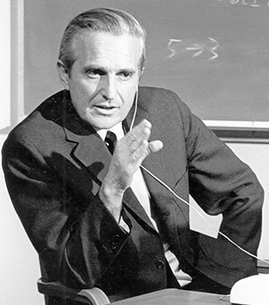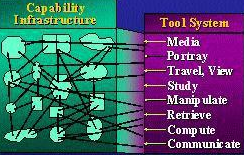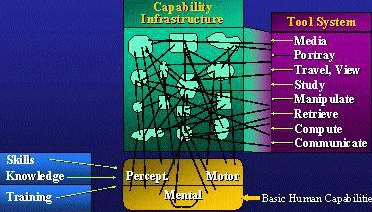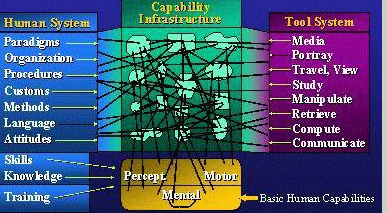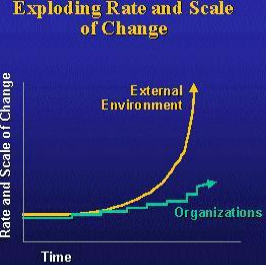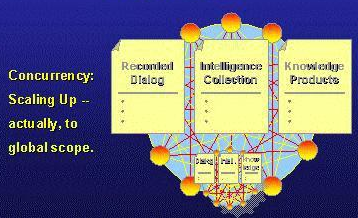Contents
Augmenting brains
Why Fleabyte?
Fleabyte fundamentals
Orality, Literacy, Computency
Unfinished Revolution
From elsewhere
Fleabyte fundamentals:
What you've got underneath may not take you to the top
A Flea in the Bonnet

Augmenting organizations' collective intellect:
|
| "When you are a visionary, it's hard to get other people to see as you do. When you have a plan to save the world through men and computers working together, as Doug Engelbart had, it's hard to enlist the guys at the water-cooler to take part in the cruisade. They called him kooky, and laughed at him for doing weird stuff." 180826-5 |
However, looking at things from Doug's perspective, it is society at large that is hogtied by its paradigms. In his words: 180826-6
| "More than we realize, we are controlled by our paradigms.... In the face of the greatest avalanche of pervasive global change ever, ever, faced by human society, our paradigm-controlled perspectives (dangerously) fail to recognize the consequent range and depth of either the threats to, or opportunities for mankind." 180826-7 |
What else is new? The word habits is probably better understood than paradigms; habits of thought, habits of how we like to be perceived by others, habits of almost unconsciously reacting to whatever we encounter, habits of talking, and so forth. And habits are proverbially hard to break. An example of this (one that bothers me no end) is the ubiquitous computer keyboard. And as computers got smaller and smaller, down to the iWatch, keyboards got smaller as well, only morphing from hardware devices to on-the-screen displays. 180826-8

The Microwriter, brought to market in 1978, is a hand-held portable word-processor with a chording keyboard. Dimensions: 23 cm x 12 cm x 5 cm. For a demo, see here. Production ceased in 1985. 180826-9
Not that there was a lack of attempts to introduce so-called chord devices to replace them, but those are met with resistance; the market simply will not readily accomodate them and many people began typing with their thumbs instead—and changing written language in the slipstream (2 for to, 4 for for, and a whole slew of other typographical shortcuts— technology leaving its mark on language. 180826-10
In 1968, Engelbart showed fruits of his vision to a large audience in San Francisco for which he received a standing ovation. Dubbed The Mother of All Demonstrations, it revealed to the world just about all major aspects of a modern Human-Computer Interaction (HCI) system. From visual, structured menus for navigating information, to the mouse and keyboard as inputs, Engelbart revealed it all, including two people miles apart interacting by using their mouse pointers moving about on a single display screen. Perceived as a crackpot before the demo, he became venerated as a visionary after. But essentially little has changed in the nearly six decades since then! Except, of course, for coming to the market of desktop computers, which happened only during the 80s. 180826-11
The question has been put just why adaptation was so slow in the coming. An answer is found in that people just didn't get it. Wrote The Economist of August 2, 2016: 180826-12
| "The only way to interact with a computer back then was through a command-line interface (CLI). You had to tell the computer, action-by-action and step-by-step, exactly what you wanted it to do. We had no idea what was happening inside the computer, no mental model to make its inner workings understandable. Before that, human-computer interaction involved putting punch cards in the right order. 180826-13 |
| "What Engelbart and his team were missing was a metaphor: a way for humans and machines to understand each other. They got one in the world's most famous Graphical User Interface (GUI): the desktop. 180826-14 |
| "This was the single most important revelation for making computers mainstream, creating enough demand to drive down the cost and make personal computers accessible to the average consumer. The Apple Lisa introduced a menu bar and window controls in 1983, and by 1985 the Atari ST and Commodore Amiga were created. Since then, apart from performance and size, little has changed." 180826-15 |
In recent years, with government support and major financial investments, there is a growing expectation that major changes are coming in how people and digital technology will interact. Finally. Question is: will those changes tilt toward augmenting human brains or replacing them. 180826-16
Getting back to Engelbart working out his vision, he gave considerable thought to the effect of scaling things down and he gave a nicely revealing example of relevant implications of such change during a colloquium held in 2000 at Stanford University. Asked he, 180826-17
| • If humans were as small as a mosquito, • If mosquitos were as large as a human, • If humans were ten times taller, wider ..., • If gravity were ten times weaker, • If digital technology were smaller, faster, cheaper; by a factor of a hundred? a thousand? a million? ten million? 180826-18 |
Well, if humans were as small as mosquitos, then, in the first place, we would be extremely over-muscled. And the effect of gravity would be almost zero. By flapping our hands fast enough we might even be able to fly. But a small problem arises from our blunt face for, if we want to take a sip of water, we'll find that the water's surface tension would not let us unless we bonk hard; and then what would happen is that our face would get wet and the surface tension would suck us right in. That's why mosquitoes do well with their long skinny noses. So, scaling down leads to an unpleasant surprise. 180826-19
How about scaling up? 180826-20
If we were ten times larger, we would not be able to move because we would weigh a thousand times as much, but would be only a hundred times as strong. And, if one were to stumble, bones would be broken. We'd have trouble breathing because the ratio of lung surface to body metabolism is at that point ten-to-one. These are things that tend to get overlooked, things that lead to surprises. 180826-21
Whether scaling down or scaling up, tipping points are reached where unpleasant surprises may be the outcome; which led Doug to think about the tools of digital technology. If they become smaller, or faster, or cheaper by a factor of a hundred, or a thousand, or a million, or ten million, what would that do? 180826-22
Whether it be our perspective on developments in digital technology, or on human affairs world-wide, or on the effects of climate change, we (dangerously!) fail to consider the consequent range and depth of either the threats to, or possible opportunities for mankind. 180826-23
We fear the worst, but trapped by a psychology of avoidance, we fail to analyze what's in the offing. By far the most people fail to thoughtfully contemplate how we might survive a nuclear attack, fail to consider how to cope with climate change, fail to examine the social institutions that have led us to where we are and their further consequences. We elect or accept leaders about whom we haven't got the slightest notion of whether they are able to guide us through perilous times. Moreover, we fail to raise our children for coping with whatever may hang over their heads and behaving in an acceptable manner under dire circumstances. All of which is the substance of my essay about what I perceive as te responsibility of our appointed senators in a threatening and threatened world (On guard in a global environment). 180826-24
Sapiens: A brief history of humankind by Yuval Harari uses some familiar words to characterize major tipping points along our way from the Big Bang to the present. Quoting: 180826-25
| "About 13.5 billion years ago, matter, energy, time and space came into being in what is known as the Big Bang. The story of these fundamental features of our universe is called physics. 180826-26 |
| "About 300,000 years after their appearance, matter and energy started to coalesce into complex structures called atoms, which then combined into molecules. The story of atoms, molecules and their interactions is called chemistry. 180826-27 |
| "About 3.8 billion years ago, on a planet called Earth, certain molecules combined to form particularly large and intricate structures called organisms. The story of organisms is called biology. 180826-28 |
| "About 70,000 years ago, organisms belonging to the species Homo sapiens started to form even more elaborate structures called cultures. The subsequent development of these human cultures is called history. 180826-29 |
| "Three important revolutions shaped the course of history: The Cognitive Revolution kick-started history about 70,000 years ago. The Agricultural Revolution sped it up about 12,000 years ago The Scientific Revolution, which got under way only 500 years ago, may well end history and start something completely different." 180826-30 |
Communication among biological organisms begat other organisms, social organisms. Communication between members of a social organism take on different forms such as chemical trails, visual signs, sounds. Our human Cognitive Revolution came about from the connection of sounds into words, and, take note, words into sentences by which modern humans can convey facts and made-up stories. It is through this revolution that, for better or for worse, Homo sapiens became Earth's dominant species. Some of the made-up stories became so strongly believed by large groups of human beings that they were taken for absolute truths. Religions, nations, states are examples of such large groups. 180826-31
A paradigm, as used by Doug Engelbart, is a typical example or pattern of something; a model. A belief so deeply ingrained as to be taken for granted is a paradigm* and it is thus that we are controlled by our paradigms; which on a global scale often lead to mass slaughter such as wars and holocausts, but on a limited scale to a more peaceful form of competition such as found in business and sports. 180826-32
As mentioned, part of Engelbart's career was a job in the aircraft industry. That gave him the opportunity to devote a lot of attention to organizational capability, the capability of a social organism. That organism might as well have been a professional association, a university, a country, some international trade pact, the United Nations. 180826-33
Social organisms, being offspring of biological organism, are subject to further evolution. Engelbart's thesis is that we need to explicitly cultivate such evolution in a way that will benefit humankind or ameliorate any disaster in the offing. Here we shall be following his train of thought in an informal manner—in contrast to Engelbart's appication of formal logic (about which a little later).* 180826-34
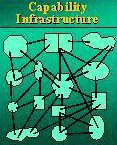
Infrastructure of capabilities with higher levels mostly dependent on lower levels. (This and following images extracted from slides shown at the symposium.) 180826-35
This illustration shows that those capability blobs are mostly dependent on other, subordinate capability blobs. If, for example, you say, well, we want to have a team meeting then you need the terminology for what you call a committee meeting; you require the capability to organize it and the capability to communicate that to those you want to participate in it. If somebody's going to take minutes or something, there is a convention for that. What is depicted is an infrastructure of capabilities. 180826-36
Calling a meeting is small potatoes, but what about an organization's core competencies, the very capabilities that make the organization valuable to those who wish to use them? Improving those core competencies makes it necessary to look down the existing hierarchy of supporting competencies and ferret out what changes need to be made there. In fact, it is likely to call for changes to be made also by the organization's suppliers of materials and services, and so forth, and so on. 180826-37
But before worrying about our suppliers' capabilities, we need to look at our own organization. We need to establish what we (our organization) ourselves can do and where we are hamstrung by any limited capabilities of others. One thing that needs checking out is what tools are availabe to make the improvements we desire. What is in our toolkit? For one thing there is such modern technology as computer hardware and software. It is at this point that Engelbart began to take issue with then available commercial editors— their WYSIWYG, "What You See is What You Get" appeals to the market because it suggests that there is little still to learn. However, much better improvements can be expected from software thet puts improvement ahead of market appeal. This led to the development and expected continued improvement of an editor called Augment which offered such capabilities as are summarily listed in the right-hand column. 180826-39
and using whatever information documents contain, things that can be readily missed by simply scrolling through a document. Among those things: the identification of paragraphs, tables, images, sounds, movies. I mentioned paragraphs, but we can go even further, down to words.* 180826-40What Doug did not bring up, but obviously needs consideration, is that the associated necessity of on-line communication requires a reliable power supply, which is hardly guaranteed in our present age of climate change, atomic warfare, and whatever other unforeseen events may occur. Clearly, we need emergency toolkits. 180826-41
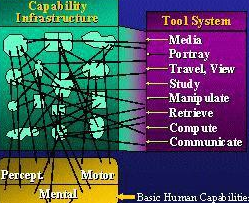
... and also depend heavily on basic human capabilities (I would say "first of all depend on human capabilities"), 180826-42
We must realize as well that the capabilities of an organization very much depends on the capabilities of its workers—unless, of course, workers are entirely replaced by machines (robots, computers). Such automation, however, carries a bag of problems of its own. And today—I am writing this in the year 2018—this form of artificial intelligence very much justifies concern. 180826-43
Not all A.I. is bad. The handheld calculater is a form of artificial intelligence; as is the dispassionate technology that helps medical doctors to better diagnose what ails their patients. But the form that will rob us of the need for human sentiments, technology that will decide how we live or even allow us to live, doing so without any concern for circumstance or audience, no empathy whatsoever, is not welcome. With that kind of artificial intelligence, a programmer's tiny misstep can spell disaster. 180826-44
Avoiding malevolent A.I. calls for the continual upgrading of human capabilities, but upgrading in a manner that takes into account that study becomes harder for people as they age. 180826-46
At this point I like to single out educators. Dependent as society is on educators, little is done to properly upgrade them. My personal experience is with college administrators who rely more on anonymous complaints, formal evaluations—also anonymous—and threats to foster some undefined performance of educators. Moreover, I found that ideas taught in universities can be swept aside by ideas presumed to be superior. Example: psychology of education used to favor behaviorism wich was suddenly replaced by cognitivism without even so much as informing former graduates. Letters to my Dawson Colleagues 180826-47
Our capacity for study and the time available for study have their limits, hence we need to rely on specialists, both off and on the job. We see a doctor, call an electrician, go to the shoestore for shoes; we need counselors in schools, professors specialized in certain disciplins in universities. We need to communicate with them. Those people as well as ourselves need to adapt to the times or, putting it differently, we need to co-evolve for if we don't, cracks begin to appear in our societal structure. Things will go awry. 180826-49
Under the heading Human system we find a list of words that call for attention. Paradigms, our intersubjective beliefs, need close attention. For example, most of us believe in the capitalist system from which we try to obtain the financial wherewithat to make a living for ourselves and our families. There just is no getting away from our need for money. Also, without it, we would have no commercial enterprises to meet needs and satisfy desires—and which even go so far as to actually create desires (salesmen, advertising). It is a paradigm that engenders, besides desirables, much waste, pollution, health problems, climate change, crime, malign A.I., warfare, the whole catastrophy. If there ever will be enough human pressure to get away from capitalism then we better first take a hard look at how we organize for the production of foodstuffs and other goods as well as providing necessay services. Appropriate procedures need to be developed, and we need a rapid evolution in our behavior: changing customs, methods, attitudes, and how we communicate—among individuals, among organizations. 180826-50
Doug Engelbart was very much preoccupied with language, in particular the Whorf hypothesis which holds that linguistic categories and usage influences our thinking and how we make decisions. That hypothesis let him to an extension, that our tools affect our thinking; recall "4 for for," etc.? Looking for a research grant he wrote, in 1962, a report presented to the U.S. Air Force Office of Scientific Research: Augmenting human intellect: A conceptual framework. In it he wrote: "... a lack of words for some types of concepts makes it hard to express those concepts, and thus decreases the likelihood that we will learn much about them. If this is so, then once a language has begun to grow and be used, it would seem reasonable to suspect that the language also affects the evolution of the new concepts to be expressed in that language." (A detailed exposition of his his thinking is found here.) 180826-51
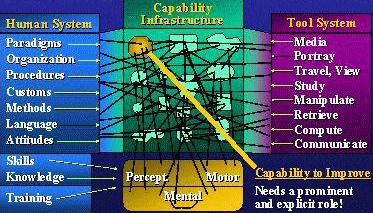
Harnessing explosive technology depends, to a high degree, on the "Capability Improvement Capability." 180826-52
We need expertise to guide us through a much needed, rapidly changing world. Whatever organization we take under the loupe, it needs a blob in that diagram to explicitly cultivate "co-evolution and attendant changes. To facilitate all of this we'd do well to use whatever better capability we acquire along the way for broadening it still further—Engelbart named this bootstrapping. 180826-53
An equestrian, puts on a boot by first putting a foot in, then using the boot's strap to pull it up. Whence the term. 180826-54
That report for the U.S. Air Force foreshadows this stated bootstrap strategy. It shows a diagram that highlights the complex task Doug had set for himself: 180826-55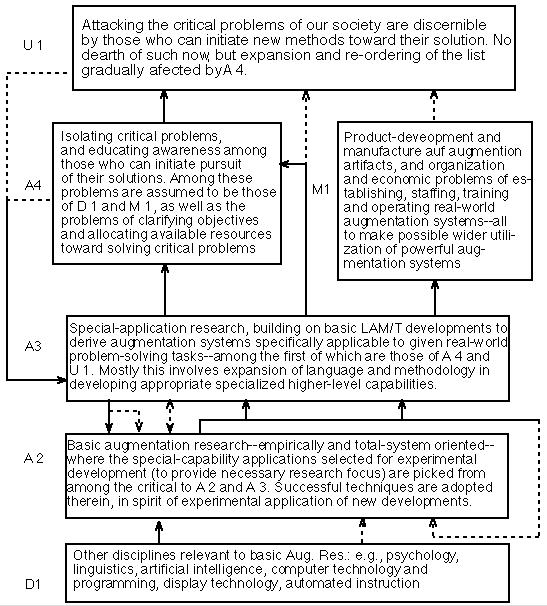
Suggested relationship among the major activities in achieving the stated objective (essentially, of significantly boosting human power in A 4 and U 1). Solid lines represent subject information or artifacts used or generated within an activity, and dashed lines represent special tools and techniques for doing the activity in the box to which they connect. Subject product of an activity (output solid) can be used as working material (input solid) or as tools and techniques (input dashed). Tools and techniques as used or needed in an activity (output dashed) can be used either to work on (input solid) or as tools and techniques to work with (input dashed). 180826-56
| "[Bootstrapping] steered very much the kind of research pursuits that we did in the sixties and seventies. Saying, okay, if we're going to learn to do collective work better, let's really do it. But if, we're not going to sit there and write reports to tell the world about it, we're going to show them. We're going to have to do it ourselves. So, everything we built, etc., was to improve the capability of the environment we lived in, and we all lived in it. 180826-58 |
| "There wasn't exactly a homogenous perception about what that would be like. I mean, there's a category of workers called software people, right? who seem to have some of their own pictures of what ought to be done in the world and all. That was a paradigm lesson, too. But, as we did get going we were up against another paradigm, that the rest of the world just thought that we were really going in the wrong direction."* 180826-59 |
The principal tool in pursuing that strategy was an oN-Line System (NLS) comprising the Augment editor hooked into a forerunner of the internet, the ARPA net (Advanced Research Projects Agency Network of the U.S. Defense Department). From the website of The Engelbart Institute we learn that: 180826-60
| "NLS/Augment is difficult to describe, since it is a very richly comprehensive environment of tools and practices for facilitating any scale of heavy knowledge work. True to the bootstrapping strategy, Doug's lab pioneered progressive work processes while using each successive version of NLS/Augment for all its own knowledge work, from drafting, publishing, email, shared screen collaborative viewing and editing, document cataloging, project management, shared address book, and all source code development and maintenance—all in an integrated hyper groupware environment filled with special features for high performance work. For example, you can create a link to any paragraph or line of code or email paragraph, you can see when paragraphs and lines of code were last edited and by whom, and even view a file filtered by author since a certain date and time (as in why doesn't the code work this morning, let's see who was in there changing what when!), you can browse with outline views, drill down into the structure of a document or source code and fly around with a number of precision browsing features and custom viewing features, and edit the structure as well as the text, within and across files and application domains. 180826-61 |
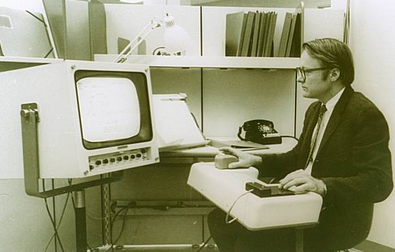
Douglas Engelbart's lead engineer Bill English in the Augmentation Research Laboratory of Stanford University (1968). On the console: a keyset (chording device), a keyboard and a mouse. 180826-62
Global changes occur at an accellerating rate and with exponentially increasing complexity such that for people and organizations it has become wellnigh impossible to keep up. 180826-64
Topping he list of potential threats to mankind today we have: 180826-65
| • climate change, • nuclear warfare, • malign artificial intelligence, • excessive capital festering outside, or barely inside, the law,180826-66 |
all of which is met by a prevalent psychology of avoidance. "I don't want to hear about it!" is a common mantra. It reminds me of a time, only three quarters of a century ago, that people didn't want to hear about the holocaust wrought by Nazi Germany. It reminds me that when Germany invaded the country of my birth; people and government had not expected this at all saying that an invasion hadn't happened during the first world war, so why should it now? 180826-68
The Millenium Project's annual State of the future lists 15 global challenges. From a recent list: 180826-69
| • Sustainable Development and Climate Change, |
| • Water and Sanitation, |
| • Population and Resources, |
| • Democratization, |
| • Global Foresight and Decision-making, |
| • Global Convergence of ICT, |
| • Rich-Poor Gap, |
| • Health Issues, |
| • Education and Learning, |
| • Peace and Conflict, |
| • Status of Women, |
| • Transnational Organized Crime, |
| • Energy, |
| • Science and Technology, |
| • Global Ethics. 180826-70 |
An executive summary of the report is available here. 180826-71
Co-operation among people and organizations requires mutual understanding, which comes from a shared common sense, a shared philosophy, a shared knowledge. As for knowledge in particular, by a long-standing tradition we have come to rely heavily on the grapholect: books, journals, newspapers, all receiving their input by arduously, slowly gathering information from the spoken word, observations, experiments, interpretations/opinions. This is followed by the slow processes of putting all this in print, distribution, selling to those who are willing to pay for it. In short: delay after delay. In the case of academic papers we have a further delay for allowing peer review. All of which puts reputation of sources ahead of the substance whatever is transmitted plus long stretches of time between discovery and utilization. Information, along the way, is subject to pollution by ambitions, greed, advertising, outright propaganda, threats, force, the whole catastrophy. 180826-72
I don't want to turn this essay into a rant, but let's face it: among the consequences are a mismatch among people supposed to be co-operating and ever less time for thinking things through before being able to take corrective action. It is in this light that it looks to me well to dust off the philosophical contribution Doug Engelbart tried to make to humanity. 180826-73
Fortunately, significant advances have been made: email, information passed on via the internet, browsing, Wikipedia, etc., but how well are those keeping up with our needs? It is here that NLS/Augment comes in. 180826-74
Doug Engelbart conceived NLS/Augment to function as a Dynamic Knowledge Repository, DKR. He conceived it as combining 180826-75
| • (a) recorded dialog between people and their external environment, • (b) intelligence collection, i.e. ingesting information from the external environment, and • (c) contributing knowledge products to the external environment; 180826-76 |
all of which entails concurrently integrating, collaborating, developing, learning, and (re)using. And all of this ever faster in an inceasingly complex world. 180826-77
An ideal DKR needs continual updating to keep its user up to scratch about what is happening outside as well as inside the organization employing him or her so as to take advantage of whatever is going on in the world and avoid unpleasant surprises. Which takes us to Cocurrent Development, Integration and Application of Knowledge, CoDIAK for short. 180826-78
CoDIAK is the concurrent evolution of DKRs within an organization AND associated organizations, eventually reaching to the level of global organizations, and the United Nations. Well, idealy. In Engelbart's words (as the transcriber received them): 180826-80
| "So, each of these groups has to keep its dynamic repository relevant and dynamic to do its job. But, at the same time the overall one has to do that, too, which has to be integrated; they all have to be integrated together. So, this integration goes farther and farther. The whole aerospace industry has to be like this—with all the vendors and parts in it, too. So, this infrastructure of inter-operative organizations, and institutions, and social units throughout the world all have to maintain that—for stability, etc. For mankind just to know. The fractures that appear cause wars, or other kinds of stuff. So, that concurrency makes a really big problem out of it. 180826-81 |
| "So, it's just saying that the standards for the way our knowledge packages are made—and the vocabulary by which we talk about the objects in it, and what you can do to those objects to show, and move, to respond to, to backtrack, et cetera—have to be a uniform, all-embracing vocabulary. And, it just simply won't fly on this scale to think at all of that vocabulary being established by the vendors of the tool systems. 180826-82 |
| "So, this brings out the absolute necessity of the end-user organizations becoming really proactive about the way the standards in the community, and the functionality that they want, and the co-evolution of their own internal processes, and customs, and practices along with the tools, rather than having the tools be shoved because they're a moneymaking thing right now. Sure, I can't argue with the market for such a tried thing for trying to be able to get cheaper and cheaper, and better and better brooms, and stoves, and things like that. But, when you're into an area in which organization, collective groups of people, is the customer in there. 180826-83 |
| "And, they're not able to be good consumers, because they've not got it together yet about what they need and what the future can do. You can't blame the vendors for shoving them around in a way that will be probably kind of laughable. I mean, assuming we do get a lot smarter about getting smarter--that in fifteen, or ten years, or twenty--I think it'd be really interesting for them, you guys, to look back and sort of chuckle about a lot of the world views about the way that this information technology world is going to be moving, or was moving at the time. So, it's our own fault." 180826-84 |
Farfetched? I'd say that by common wits at the time that certainly was farfetched. I believe that even today that would be still so for most of mankind and its movers and shakers. Even among those who wrack their brains about how to improve the world. 180826-85
Engelbart received many accolades and awards for his philosophy as well as for his technical contributions, but his ideas have not embraced by financiers, corporations, governments. All shied away when it comes to acting on them. 180826-86
The question has been put why? The answer might well found right here: too farfetched. More farfetched, it appears, than taking out all sorts of long-term insurance and sending our offspring to schools and universities. Corporate executives embrace planning ahead, which, incidentally takes notice of whatever the competition may be up to, something, that man-machine interacting DKRs would do far better. There may well be other factors at work here, such as a psychology of avoidance, not stepping out of line, not wishing to face consequences—of climate change, of handing over the leads to higher-level organizations (governments with their anonymous regulators). 180826-87
Isn't any effort to revive a continuation of all that H-LAM/T stuff like closing the gate after the horse is gone? But how about such piecemeal developments then as chemically drawing CO2 from the air, exploring the feasibility of neural support with brain implants, full-fletched A.I. without considering what in the world would be affected? Wouldn't Engelbart's highly disciplined mode of logical thinking things through be a better option? Ask yourself. 180826-88
In conclusion, here is a little exercise. Let's depict complexity as the number of single lines or connections between two points, meaning two events. Here goes: 180826-89
| Events | Complexity | |
| 1,000,000 | 499,999,500,000 | |
| 1000 | 499,500 | |
| 100 | 4950 | |
| 10 | 45 | |
| 7 | 21 | |
| 6 | 15 | |
| 5 | 10 | |
| 4 | 6 | |
| 3 | 3 | |
| 2 | 1 180826-90 |
Ah! The very stuff exponential curves are made of; like the one shown above. Akin to this, we might give some thought to Earth's increasing population of human beings, many of us being jostled about by warfare, terrorism, culture clashes, and, coming to a country near you, pushed across international borders by rising sea levels, and so forth. Every connection between two people is a potential source of some conflict of sorts. There is our curve again. Hyperbole? Consider, every tiny fart contributes to global warming, every bit of plastic one buys eventually ends up polluting land, water, and air to the detriment of everybody's food supply, etc. Tiny contributions that all add up without anyone being held responsible. But society is and, consequently, is being penalized for it. 180826-91
Transcripts of the entire colloquium:
The Unfinished Revolution
| top of page |
|
Footnotes
It doesn't seem quite certain whether hyperlinks were invented by Doug Engelbart or his friend Ted Nelson. Neither one claims the honor for himself. * fn1
Such a widely shared ingrained belief may also be referred to as intersubjective, a term used in philosophy, psychology, sociology, and anthropology to conceptualize the psychological relation between people. * fn2
Formal logic serves to ensure that in the process of reasoning nothing is overlooked. Engelbart captured his thinking in symbolic form thus: H-LAM/T, meaning "Human using Language, Artifacts, Methodology, in which he is Trained" where
1. Artifacts are physical objects designed to provide for human comfort, for the manipulation of things or materials, and for the manipulation of symbols.
2. Language is the way in which the individual parcels out the picture of his world into the concepts that his mind uses to model that world, and the symbols that he attaches to those concepts and uses in consciously manipulating the concepts ("thinking").
3. Methodology comprises the methods, procedures, strategies, etc., with which an individual organizes his goal-centered (problem-solving) activity.
4. Training—the conditioning needed by the human being to bring his skills in using Means 1, 2, and 3 to the point where they are operationally effective. (Ref. Conceptional framework.) * fn3
Many words found in the Wikipedia are hyperlinked to brief descriptions of their meaning. And turning to the Perseus Project at Taft's University we found documents in classic Latin and Greek in which every word is hyperlinked to a translation. * fn4
Doug was being pushed toward pursuing artificial intelligence, which went against his conviction that it is augmenting the human intellect that the world needs. His resistance cost him his research grant from the Air Force. * fn5
--
| top of page |
|
